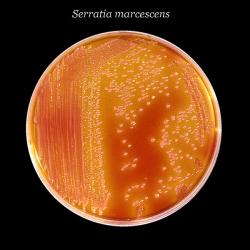Source Institutions
Source Institutions
Add to list Go to activity
Activity link broken? See if it's at the internet archive

This experiment allows learners to experience a small scale "epidemic," demonstrating the ease with which disease organisms are spread, and enables learners to determine the originator of the "epidemic." Learners will transfer live bacteria by hand contact, then transfer an inoculum to a nutrient agar plate for 24 hour incubation. After incubation, plates are observed for growth of the microbial agent. By arranging the plates in the order of hand contact, it can be determined which individual received the original contaminant and started the "epidemic," which individuals transferred the organism yet did not grow it out (carriers), and how dosage, or amount of contamination, affects getting a disease. Other means of microbial transmission (air, water, body fluids, fomites) may also be discussed. This lesson guide includes safety precautions, questions, and an additional activity to simulate vaccination.
- 4 to 24 hours
- 4 to 24 hours
- Over $20 per group of students
- Ages 14 - adult
- Activity, Experiment/Lab Activity, Lesson/Lesson Plan, Simulation
- English
Quick Guide
Materials List (per group of students)
- 1- 24 hour nutrient broth culture of Micrococcus roseus or Serratia marcescens
- Sterile water
- Sterile serological pipette
- Hard candy (peppermints work well)
- Sterile Petri dishes
- Sterile cotton swabs
- Disinfectant hand soap
- Disinfectant cleaner
- Disposable gloves
- Laboratory marker
- Lab coats
- Incubator, 32-37degC
Subjects
-
Life Sciences
- Cells
-
Diversity of Life
- Viruses and Bacteria
-
Human Body
- Health and Nutrition
- Medicine
- Immune System
-
Physical Sciences
- Chemistry
-
Mathematics
-
Data Analysis and Probability
- Data Analysis
- Data Collection
-
Data Analysis and Probability
-
The Nature of Science
-
The Scientific Process
- Conducting Investigations
- Gathering Data
- Formulating Explanations
- Communicating Results
-
The Scientific Process
Informal Categories
- Food and Cooking
Audience
To use this activity, learners need to:
- see
- see color
- read
- touch
Learning styles supported:
- Involves hands-on or lab activities
Other
This resource is part of:
Access Rights:
- Free access
By:
- Powel, M. Beth
Rights:
- All rights reserved, Access Excellence @ the National Health Museum, 2009
